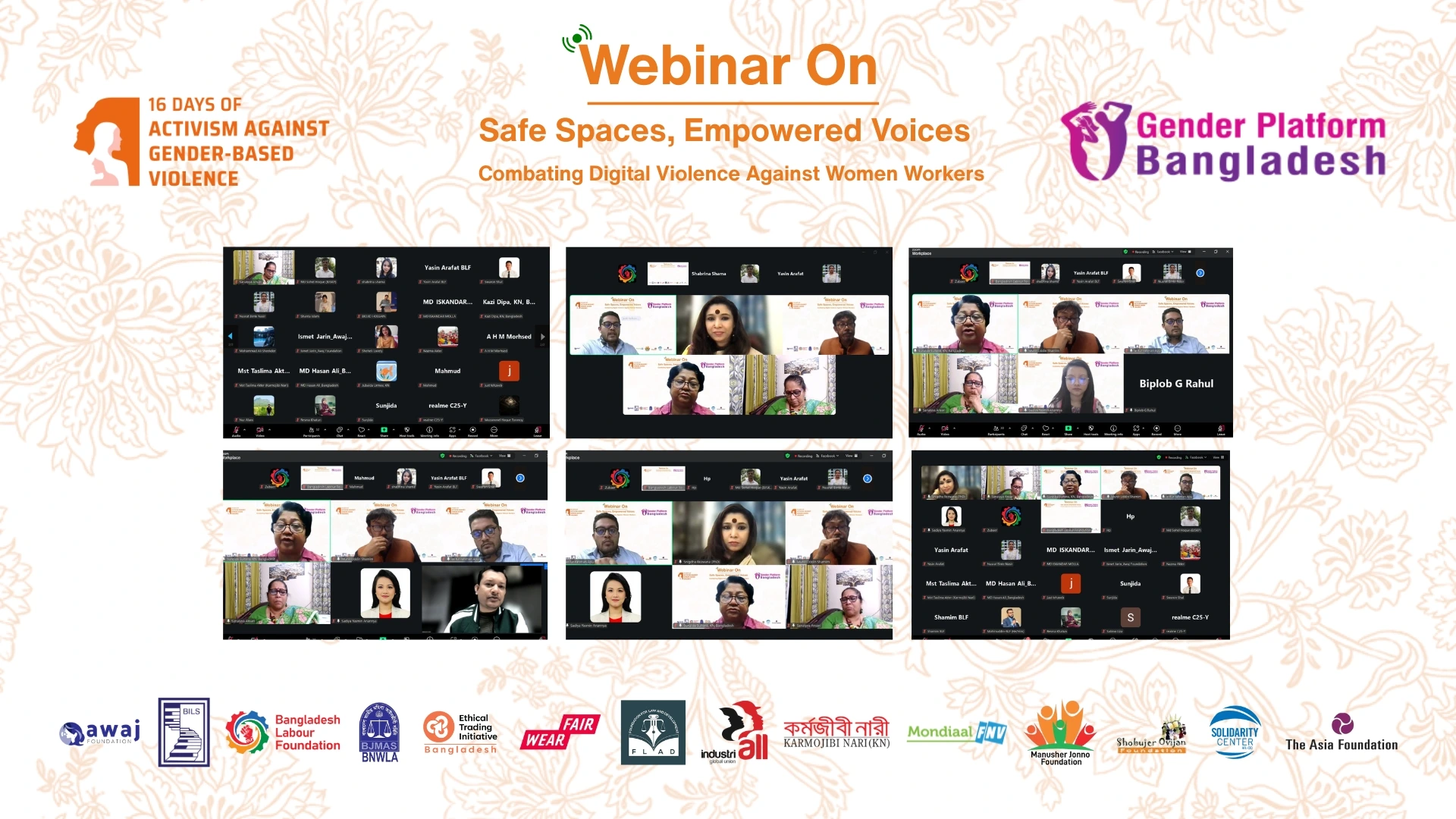
Candlelight Solidarity on World Human Rights Day
On World Human Rights Day, Gender Platform Bangladesh brought together activists, workers, and community members at Manik Mia Avenue for

Lorem Ipsum is simply dummy text of the printing and typesetting industry. Lorem Ipsum has been the industry’s standard dummy text ever since the 1500s, when an unknown printer took a galley of type and scrambled it to make a type specimen book. It has survived not only five centuries, but also the leap into electronic typesetting, remaining essentially unchanged. It was popularised in the 1960s with the release of Letraset sheets containing Lorem Ipsum passages, and more recently with desktop publishing software like Aldus PageMaker including versions of Lorem Ipsum.
The readymade garment (RMG) export sector is one of the most significant contributors to the national economy, providing employment to millions of workers, primarily women. Despite its economic importance, the sector faces critical challenges, including unsafe working conditions, long hours, low wages, and lack of job security.
Unsafe Work Environments: Many factories do not meet safety standards, leading to accidents and health hazards.
Low Wages: Workers often earn below a living wage, struggling to meet basic needs.
Long Working Hours: Extended shifts with inadequate breaks are common.
Limited Rights and Representation: Many workers lack awareness of their rights and face challenges in forming unions.
Our organization works to address these issues by:
Advocating for Labor Rights: We collaborate with policymakers, industry stakeholders, and trade unions to enforce better labor standards.
Workplace Safety Initiatives: Implementing training programs and safety audits to reduce workplace hazards.
Wage and Benefits Advocacy: Promoting fair wages, health benefits, and social security for workers.
Legal Assistance: Providing legal aid to workers facing rights violations.
Empowering Workers: Conducting awareness campaigns to educate workers about their rights.
We have successfully contributed to:
Improved safety standards in several factories through our safety training programs.
Wage increases for thousands of workers through advocacy and negotiations.
Legal support resulting in justice for unfairly treated workers.
Strengthened worker unions and collective bargaining efforts.
The readymade garment export industry must continue evolving towards ethical and sustainable labor practices. Through our efforts, we aim to build a future where garment workers enjoy fair wages, safe workplaces, and dignity in employment.

The readymade garment (RMG) export sector is one of the most significant contributors to the national economy, providing employment to millions of workers, primarily women. Despite its economic importance, the sector faces critical challenges, including unsafe working conditions, long hours, low wages, and lack of job security.
Unsafe Work Environments: Many factories do not meet safety standards, leading to accidents and health hazards.
Low Wages: Workers often earn below a living wage, struggling to meet basic needs.
Long Working Hours: Extended shifts with inadequate breaks are common.
Limited Rights and Representation: Many workers lack awareness of their rights and face challenges in forming unions.
Our organization works to address these issues by:
Advocating for Labor Rights: We collaborate with policymakers, industry stakeholders, and trade unions to enforce better labor standards.
Workplace Safety Initiatives: Implementing training programs and safety audits to reduce workplace hazards.
Wage and Benefits Advocacy: Promoting fair wages, health benefits, and social security for workers.
Legal Assistance: Providing legal aid to workers facing rights violations.
Empowering Workers: Conducting awareness campaigns to educate workers about their rights.
We have successfully contributed to:
Improved safety standards in several factories through our safety training programs.
Wage increases for thousands of workers through advocacy and negotiations.
Legal support resulting in justice for unfairly treated workers.
Strengthened worker unions and collective bargaining efforts.
The readymade garment export industry must continue evolving towards ethical and sustainable labor practices. Through our efforts, we aim to build a future where garment workers enjoy fair wages, safe workplaces, and dignity in employment.

On World Human Rights Day, Gender Platform Bangladesh brought together activists, workers, and community members at Manik Mia Avenue for

The 16 Days of Activism Against Gender-Based Violence campaign concluded with a powerful call to action on Human Rights Day.

Bangladesh Labour Foundation (BLF) is pleased to announce the successful completion of the webinar titled “Safe Spaces, Empowered Voices: Combating

A discussion session and rally were held with tannery workers at the Tannery Workers Union office, jointly organized by Gender